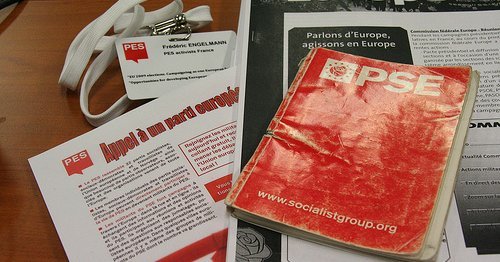If useless bickering has to be avoided, it is important for the European socialists to recognize the collective mistakes made during this campaign. If they do not do so now, they run a double risk: that the disagreements reappear at a less appropriate time, and (worse still) that the same mistakes are made again in the next campaign, which could only results in even more disappointing results. There would be much to say about the identity crisis that socialism in Europe is going through, but it is exclusively on the campaign mistakes that we will focus here. Without mercy, but always keeping the criticism constructive, let’s see what these mistakes were.
An over-nationalization of the stakes
This cannot be highlighted enough. Just like a national campaign is fought on national issues, a true European campaign should be focused on European issues. Sadly, most socialist parties went in the opposite direction, going for the easy option. In France for instance, the PS heavily criticized the MoDem for focusing the debate on opposing the president Sarkozy. But the compliment could really have been returned to them. Talking about a “sanction vote” or purely national matters means considering the voters too stupid to understand what is at stake, and further reducing their little interest in European elections. Admittedly, the fault is shared and the socialists weren’t the only ones to adopt such a political stance. But they missed a good opportunity to stand out and boost their political visibility by really talking about Europe.
A lack of leadership
This has also been repeated throughout the campaign, but it is worth insisting: the Party of European Socialists (PES) should have proposed a candidate for the presidency of the Commission. Whether Martin Schulz likes it or not (read about this his unconvincing reply to a post criticizing his stance on the issue), the parliament could perfectly have imposed another president to the governments (today this seems extremely unlikely). Anticipating their own defeat, a number of socialist leaders preferred to take the safe bet by announcing their support for Barroso. The results seem to prove them right. Except that this strategy is based on a self-fulfilling prophecy: it is because the socialists failed to appear united and capable of proposing a real alternative that they failed, not the other way around!
Too much focus on the criticism, not enough on the proposals
Criticism is healthy as long as it is used as a springboard to put forward a true alternative. But clearly, in many countries the socialists have not been able or willing to focus on their concrete proposals, preferring to concentrate almost exclusively on criticizing the right and what they have done the past few years. This can only yield counterproductive results, as the right is put at the middle of the campaign and the left gets trapped in the image of the frenzied opponent. This is even more of a pity considering credible proposals (notably an efficient response to the crisis) were to be found in the PES manifesto, which has insufficiently been used.
Unexplored political fields
It is of course logical that in this time of crisis the campaign focused on economic issues, but it is regrettable that the socialists didn’t take the initiative to expand the debate to other important topics. For instance, the refusal by the right to expand the maternity leave, or to condemn the pope’s shocking declaration were (missed) opportunities for the left to highlight its positions in front of the current conservative climate. Criticizing (ultra-)liberalism is no longer enough: if socialists want to embody tomorrow’s progressive force, they must be more daring, and in all political fields.
In spite of those important mistakes, there were also some positive aspects in this campaign: a vigorous criticism, numerous campaign exchanges, and a manifesto largely recognized as excellent. Based on this critical assessment, let’s hope the socialists will learn the lessons from this campaign and make the appropriate conclusions. Because in the meantime Europe will not wait, and the challenges are many.


Follow the comments: |
|
